Related Research Articles
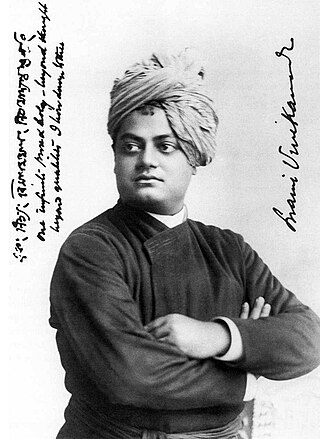
Swami Vivekananda, born Narendranath Datta, was an Indian Hindu monk, philosopher, author, religious teacher, and the chief disciple of the Indian mystic Ramakrishna. He was a key figure in the introduction of Vedanta and Yoga to the Western world, and the father of modern Indian nationalism who is credited with raising interfaith awareness and bringing Hinduism to the status of a major world religion.

Warren Hastings was a British colonial administrator, who served as the first Governor of the Presidency of Fort William (Bengal), the head of the Supreme Council of Bengal, and so the first Governor-General of Bengal in 1772–1785. He and Robert Clive are credited with laying the foundation of the British Empire in India. He was an energetic organizer and reformer. In 1779–1784 he led forces of the East India Company against a coalition of native states and the French. In the end, the well-organized British side held its own, while France lost influence in India. In 1787, he was accused of corruption and impeached, but he was eventually acquitted in 1795 after a long trial. He was made a Privy Councillor in 1814.

Chakravarti Rajagopalachari BR, popularly known as Rajaji or C.R., also known as Mootharignar Rajaji, was an Indian statesman, writer, lawyer, and independence activist. Rajagopalachari was the last Governor-General of India, as when India became a republic in 1950 the office was abolished. He was also the only Indian-born Governor-General, as all previous holders of the post were British nationals. He also served as leader of the Indian National Congress, Premier of the Madras Presidency, Governor of West Bengal, Minister for Home Affairs of the Indian Union and Chief Minister of Madras state. Rajagopalachari founded the Swatantra Party and was one of the first recipients of India's highest civilian award, the Bharat Ratna. He vehemently opposed the use of nuclear weapons and was a proponent of world peace and disarmament. During his lifetime, he also acquired the nickname 'Mango of Salem'.

Mangalampalli Balamuralikrishna was an Indian Carnatic vocalist, musician, multi-instrumentalist, playback singer, composer, and character actor. He was awarded the Madras Music Academy's Sangeetha Kalanidhi in 1978. He has garnered two National Film Awards, the Sangeet Natak Akademi Award in 1975, the Padma Vibhushan, India's second-highest civilian honor in 1991, for his contribution towards arts, the Mahatma Gandhi Silver Medal from UNESCO in 1995, the Chevalier of the Ordre des Arts et des Lettres by the French Government in 2005, the Sangeetha Kalanidhi by Madras Music Academy, and the Sangeetha Kalasikhamani in 1991, by the Fine Arts Society, Chennai to name a few.

T. V. Sankaranarayanan, was an Indian Carnatic vocalist, known for his music that stems from the style of his guru and maternal-uncle, Madurai Mani Iyer. TVS was awarded the Madras Music Academy's Sangeetha Kalanidhi in 2003.

Job Charnock was an English administrator with the East India Company. He is commonly regarded as the founder of the city of Calcutta ; however, this view is challenged, and in 2003 the Calcutta High Court declared that he ought not to be regarded as the founder. There may have been inhabitants in the area since the first century CE. The High Court was right in claiming that villages that constituted colonial Calcutta were not established by Charnock or the British Raj itself, but Charnock’s ambition-driven doggedness toward setting up a East Indian Company frontier along the Eastern border of India that he could control on his own terms played a huge role in the creation of present day city of Calcutta.

Thomas Daniell was an English landscape painter who also painted Orientalist themes. He spent seven years in India, accompanied by his nephew William, also an artist, and published several series of aquatints of the country.

Thiruvallikeni known as Triplicane, is one of the oldest neighbourhoods of Chennai, India. It is situated on the Bay of Bengal coast and about 0.6 km (0.37 mi) from Fort St George. The average elevation of the neighbourhood is 14 metres above sea level.
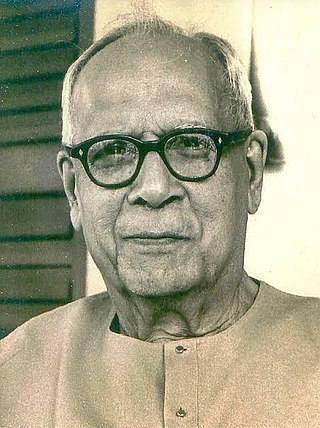
Ramesh Chandra Majumdar was a historian and professor of Indian history. Majumdar is a noted historian of modern India. He was a former Sheriff of Kolkata.

Narasimhan Ravikiran is an Indian slide instrumentalist, vocalist, composer, and orator, who created the concept of melharmony. He is the son of gottuvadhyam player Chitravina Narasimhan and the grandson of Narayan Iyengar, who was also a Carnatic musician.
Madras Time was a time zone established in 1802 by John Goldingham, the first official astronomer of the British East India Company in British India when he determined the longitude of Madras as 5 hours, 21 minutes and 14 seconds ahead of Greenwich Mean Time. It has been described as 8 minutes and 46 seconds from UTC+05:30 and 32 minutes and 6 seconds behind Calcutta Time which puts it at (UTC+05:21:14). Before India's independence, it was the closest precursor to Indian Standard Time which is derived from the location of the observatory at 82.5°E longitude in Shankargarh Allahabad in Uttar Pradesh.

Parakkal Unnikrishnan is an Indian Carnatic vocalist and playback singer.
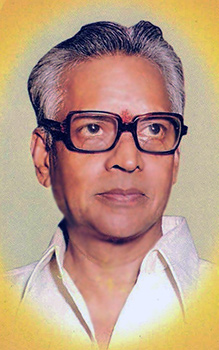
Saluri Rajeswara Rao was an Indian composer, multi instrumentalist, conductor, singer, and music producer known for his works predominantly in South Indian cinema. Regarded as one of the finest music composers, Rajeswara Rao's works are noted for integrating Indian classical music in Telugu cinema for over half a century.
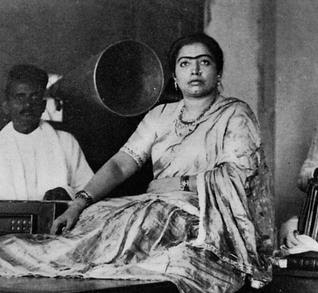
Gauhar Jaan was an Indian singer and dancer from Kolkata. She was one of the first performers to record music on 78 rpm records in India, which was later released by the Gramophone Company of India and resulted in her being known as "the Gramophone girl" and "the first recording superstar of India". Having recorded more than 600 songs in more than ten languages between 1902 and 1920, Jaan is credited with popularising Hindustani classical music such as thumri, dadra, kajri, and tarana during the period.

Debashish Bhattacharya is an Indian classical musician, singer, composer and educator. He is said to have introduced the first Slide Guitar Syllabus in the world. Bhattacharya redefined Indian classical music on slide guitar through the introduction of a new playing technique and sound, as well as a blending of traditional and uniquely contemporary approaches in designing his music. A music producer who plays lap slide guitar, he has taught more than a thousand students, created a new genre, designed his own instruments and performed in more than two thousand concerts and workshops, with Grammy nominations and several world music awards. His latest guitar creation, the Pushpa Veena, is perhaps the first slide instrument in the world with a top made of animal skin. For Hindustani Raag music he has composed three new Raag, set to evening time: "Raag Palāsh Priyā," "Raag Shankar Dhwani" and "Raag Chandra Mālikā". Recipient of World Music Hall of Fame 2022. Grammy nominee 2009, BBC award 2007, Asiatic Society Gold Medal 2005 and President of India Gold medal 1984.

Umayalpuram Kasiviswanatha Sivaraman is an Indian musician and exponent of the Carnatic percussion instrument, the mridangam. He is a recipient of the Padma Vibhushan as well as the Sangeet Natak Akademi Award.
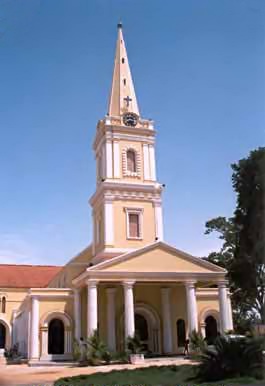
Charles Theophilus Ewald Rhenius was a German born missionary of the Church Mission Society (CMS). He was the first CMS missionary to arrive at India. For his missionary work in the Tirunelveli district he came to be known as the "Apostle of Tirunelveli". He was involved in the attempt to revise the Fabricius version of the Tamil Bible and also published a Tamil grammar book. Rhenius’ split from the Anglican Church in 1830 and started his own congregation. Rhenius' work was recognized in 1980 by the Reverend Daniel Abraham, the then Church of South India (CSI) bishop of Tirunelveli diocese. Rhenius's work was given official recognition by the Anglican Communion during the Tirunelveli diocese bicentenary celebration in 1980, in which, all the bishops, including Anglican bishop Stephen Neill and all the presbyters took an oath in front of the tomb of Rev Rhenius to follow the path of the resting soul, regard to evangelism.
Louis Banks is an Indian film composer, record producer, keyboardist, and singer. He has often been referred to as the 'Godfather of Indian jazz'.
Handel Manuel was an Indian pianist, organist, conductor, composer and accompanist. He helped to make western classical music popular in Chennai, the capital of the Indian state of Tamil Nadu.

The statue of Thomas Munro is an equestrian statue of Thomas Munro, 1st Baronet, Major-General in the British Army and Governor of Madras from 1820 to 1827, located in the city of Chennai, India. The bronze statue sculpted by Francis Chantrey in the United Kingdom in 1834 and shipped to Madras in 1839, is one of the popular landmarks in Chennai. The absence of stirrups is one of the peculiarities of the statue and for this reason, it is also referred to as "The Stirrupless Majesty".
References
- ↑ FREDERICK, PRINCE (6 December 2010). "Strumming up success". Calcutta: The Hindu. Retrieved 7 December 2010.
- ↑ CHOWDHURY, SOUVIK (16 September 2003). "Classical concerto". The Hindu. Archived from the original on 4 October 2003. Retrieved 7 December 2010.
{{cite news}}: CS1 maint: unfit URL (link)